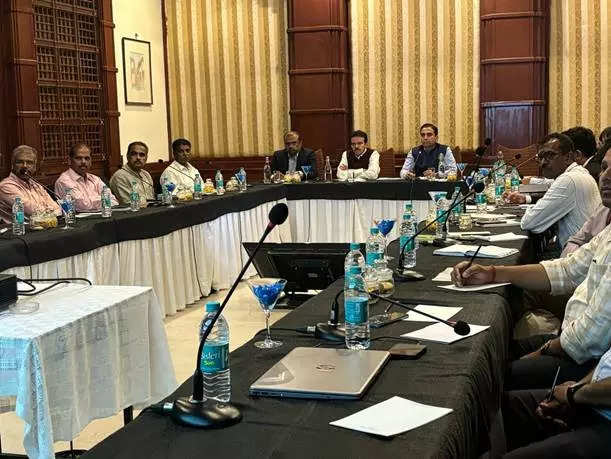
The Union Ministry of Ports, Shipping and Waterways (MoPSW) along with Cochin Shipyard Ltd (CSL) and Inland Waterways Authority of India (IWAI) has organized a two-day conference in Kochi, Kerala on April 23-24. The theme of the conference was ‘Challenges and Prospective Solutions in Inland Waterways and Shipbuilding’ and it brought together various state departments, industry experts and stakeholders to delve into pressing issues within the maritime sector. The conference, which featured four insightful sessions, focused on the imperative of decarbonizing the maritime industry and addressed critical challenges in inland water transport and shipbuilding. Participants actively engaged in sharing key challenges faced by them and suggested possible interventions by the government in order to swiftly achieve the cargo modal shift to waterways, apart from boosting domestic shipbuilding, according to a press release issued by the ministry on Friday.
Joint Secretary, MoPSW, R. Lakshmanan said, “The two-day conference at Kochi successfully facilitated enriching discussions encompassing India’s key priorities including Green Transition of Inland Waterways, establishment of a dedicated Sectoral Maritime Development Fund, promoting domestic shipbuilding, etc. This is one among many such meetings being conducted by the ministry to identify and address the key challenges faced by the maritime stakeholders in achieving the targets set forth in Maritime Amrit Kaal Vision 2047.”
The inaugural session brought to the fore MoPSW’s decarbonization efforts in the inland waterways sector being spearheaded by IWAI and CSL by deployment of Green Hydrogen Fuel Cell Inland Vessels, aligning with MoPSW’s Harit Nauka Guidelines. Varanasi has been selected as the pilot location for immediate deployment on NW-1, with expansion plans informed by pilot learnings. It was discussed that discussions are ongoing with potential players for facilities such as bunkering, etc. Furthemore, it was informed that due to its low emission qualities, Methanol is also actively considered as one of the key green fuels for EXIM Vessels globally as seen in the recent case of Maersk’s deployment of Methanol Powered Ships. Going forward, it was suggested to explore mechanisms of developing indigenous development of Methanol marine engines in the country as a progressive step towards Green Transition of Inland Vessels, the release said.The afternoon session delved into the pressing financing needs of India’s shipping sector, underscoring the mammoth investment requirement of approximately Rs 70-75 lakh crore as outlined in the Maritime Amrit Kaal Vision 2047. Despite this substantial need to support the country’s projected trade and economic expansion, there’s a notable absence of forthcoming finance sources, including bank credit and foreign investment. The discussion illuminated various financing challenges encountered by Indian maritime stakeholders, particularly in the shipping sector.
The challenges include the non-availability of long-term funding, which is crucial for sustainable growth, along with lower interest rates. Additionally, the presence of fixed sectoral lending limits as per RBI credit concentration norms pose a significant hurdle, restricting the availability of credit by capping each bank’s exposure to individual companies or networks of companies. Moreover, the lack of asset-based financing by banks/financial institutions (FIs) acts as a deterrent for shipping sector borrowers, it said.
In response to these challenges Lakshmanan shared insights into the ministry’s proactive efforts. The ministry is actively working on establishing a dedicated Maritime Development Fund, akin to established sectoral Financial Institutions such as Power Finance Corp. Ltd, REC, IRFC, etc. This fund aims to cater to the unique and substantial funding requirements of the maritime sector, enabling the implementation of specific initiatives such as shipbuilding, decarbonization, green energy adoption, technology innovation, and manpower training and development.
Industry stakeholders welcomed this initiative and provided valuable feedback, recognizing its potential to address the pressing financing needs and propel the holistic development of the maritime sector as envisioned in Maritime Amrit Kaal Vision 2047.


